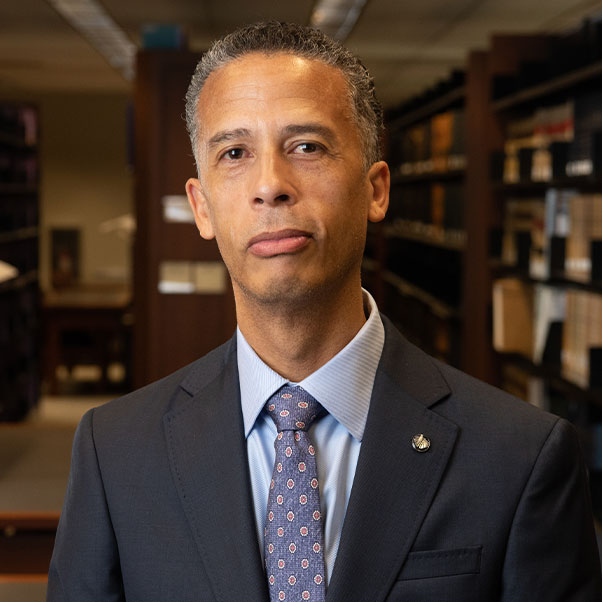Michael Pinard is the Francis & Harriet Iglehart Professor of Law; the Honorable William H. Murphy Jr., Faculty Director of the Gibson-Banks Center for Race and the Law, which launched in October 2023; and director of the Clinical Law Program. Professor Pinard writes and teaches broadly about race, intersectionality, and the criminal legal system, including the criminalization of race (children, adults, and communities); policing; incarceration; criminal records; exclusionary school discipline of K-12 students; and the intersectional harms of the criminal and civil legal systems.
Professor Pinard has taught several courses at the law school, including Youth, Education, and Justice Clinic; Race and Decarceration in Maryland; the Reentry Clinic; Law and Social Change (1L elective); Policing, Communities, and the Law; the Permanence of Criminal Records; Freddie Gray’s Baltimore: Past, Present and Moving Forward (with colleagues); Criminal Procedure; Criminal Procedure II; Legal Profession; the Criminal Defense Clinic; and Comparative Criminal Process (Aberdeen, Scotland).
Professor Pinard has worked to improve the criminal legal system nationally and locally through legislative and policy advocacy, scholarship, opinion pieces, and participation in various working and advisory groups. He serves on the Maryland Equitable Justice Collaborative, a partnership led by the Office of the Attorney General and Office of the Public Defender focused on reducing incarceration in Maryland. Recently, he served on the transition team for Maryland Attorney General Anthony Brown as co-lead of the Public Safety Team.
Professor Pinard has been active nationally in efforts to improve legal education. He is co-editor-in-chief of the Clinical Law Review. He has chaired the AALS Section on Civil Rights and co-chaired the AALS Section on Litigation, was president of the Clinical Legal Education Association (CLEA), has served the AALS Section on Clinical Legal Education as co-chair of the Clinical Scholarship Committee and chair of the Nominations Committee, and has served the ABAs Section on Legal Education and Admissions to the Bar as a member of the Clinical Skills Committee.
Professor Pinard currently serves as board chair of the Gault Center, as a commissioner with the Maryland Access to Justice Commission, and on the leadership council of the Public Justice Center. He has served as a board member of the Public Justice Center, an advisory committee member of the Maryland Reentry Partnership and the Prisoner Reentry Institute at John Jay College of Criminal Justice, and as chair of the Maryland State Bar Association’s Legal Education and Bar Admissions Committee.
In 2013, Professor Pinard was elected to the American Law Institute. In 2024, he was co-recipient of the Michael A. Olivas Award for Outstanding Leadership in Diversity and Mentoring in the Legal Academy by the Association of American Law Schools; in 2011, he was honored as a Champion of Change by the White House for his work on behalf of individuals with a criminal record; and in 2008, he received the Shanara Gilbert Award from the Clinical Section of the Association of American Law School as an emerging clinical law professor committed to teaching and achieving social justice.
Professor Pinard received his juris doctor from New York University School of Law. He was a staff attorney with the Neighborhood Defender Service of Harlem and the Office of the Appellate Defender in New York City. From 1998 to 2000, he was a Robert M. Cover Clinical Teaching Fellow at Yale Law School. Prior to coming to Maryland in 2002, he was an assistant professor at St. John’s University Law School and a visiting associate professor at Washington University School of Law in St. Louis. From 2008 to 2009, he was a visiting professor at New York University School of Law. In spring 2015, he was a scholar-in-residence at Columbia Law School.

